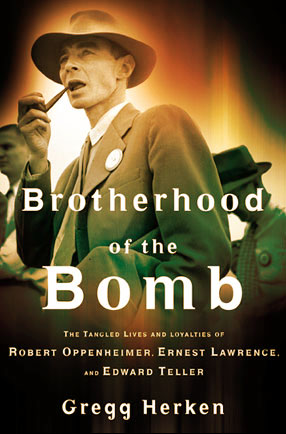Brotherhood
of the Bomb:
The
Tangled Lives and Loyalties of Robert Oppenheimer, Ernest Lawrence,
and Edward Teller (Henry
Holt and Co. 2002)

|
[ NEW EVIDENCE: Website updated 2023 ]
View documents posted by the author. Click the
document then maximize the pop-up window for best viewing.
Since publication
of Brotherhood of the Bomb several new documents have surfaced which support the book's conclusion that Robert Oppenheimer was a member of a "closed unit" of the Communist Party's professional section in Berkeley, from 1937 to early 1942. These, and other documents referenced in my book, are available to researchers at Stanford University's Hoover archive.
The first document is an excerpt from Haakon Chevalier's unpublished memoir, "The Bomb," which remained unfinished at the time of Chevalier’s death in 1985. It concerns the publication of two "Reports to our Colleagues" by the "closed unit" to which Chevalier and Oppenheimer belonged.
The second document is the unpublished journal of Barbara Chevalier, Haakon Chevalier's widow. Barbara died in July 2003, and my notes on her journal, which I read with her permission, appear below.
The third document is the unpublished memoir of Gordon Griffiths, who acted as the Commmunist Party's official liaison with the closed Berkeley unit. Griffiths died in January 2001. His children, who recently donated their father's memoir to the Library of Congress, wrote in their deed of gift: "Gregg Herken's "Brotherhood of the Bomb" has reopened the question of whether Oppenheimer was ever a member of the Communist Party. We are in possession of some material that bears on this issue--and, for whatever it is worth--thought we should make it available to responsible historians." Portions of the Griffiths manuscript are reproduced below.
New
Evidence Document #1: Excerpt from Haakon Chevalier's unpublished memoir, "The Bomb."
New
Evidence Document #2:
Excerpts from Barbara Chevalier's unpublished journal, "Robert
Oppenheimer and Haakon Chevalier: From the Memoirs of Barbara Chevalier."
New Evidence Document #3:
Excerpts from Gordon Griffiths' unpublished memoir, "Venturing
Outside the Ivory Tower: The Political Autobiography of a College
Professor"
New
Evidence Document #4:
Author's Note: Is belonging to a "closed unit" in the
CP tantamount to Communist Party membership?
.
Document
Set #1
“Was Oppenheimer a ‘Closet Communist?’”
 Click
to view document 1
Click
to view document 1
Chevalier
to Oppenheimer, July 23, 1964, Robert Oppenheimer papers, Library
of Congress Preparing his memoirs for publication, Haakon Chevalier
notifies Oppenheimer that he plans to reveal that both were members
of the same secret underground unit of the Communist Party's professional
section from 1938 to 1942.
 Click
to view document 2
Click
to view document 2
Oppenheimer
to Chevalier, Aug. 7, 1964, Robert Oppenheimer papers, Library of
Congress In reply, Oppenheimer denies ever having been a member
of a Communist Party unit.
 Click
to view document 3
Click
to view document 3
Transcript
of 3/18/65 telephone call between Lloyd Garrison and Oppenheimer,
Robert Oppenheimer papers, Library of Congress Oppenheimer discusses
with Garrison, his attorney, the possibility of enjoining publication
of Chevalier's book. Chevalier will ultimately describe the unit
in his memoirs as simply "a discussion group."
 Click
to view document 4
Click
to view document 4
"Report
to Our Colleagues," February 20, 1940, Bancroft Library, Univ. of
Calif., Berkeley This is the first of two "Reports" that Chevalier
claims he and Oppenheimer wrote and distributed while members of
the Party's professional section in 1940. It is referred to in Documents
1 and 3.
 Click
to view document 5
Click
to view document 5
Chevalier
to [name withheld], April 25, 1973, Haakon Chevalier papers, Valreas,
France In response to a researcher's question, Chevalier identifies
four of the eight members of the secret unit, all dead at the time
of his letter.
Document
Set
#2
"Was
Robert Oppenheimer a spy?"
 Click
to view document 1, of set #2
Click
to view document 1, of set #2
Merkulov
to Beria, Oct. 2, 1944, excerpt from Sacred Secrets: How Soviet
Intelligence Operations Changed American History by Jerrold and
Leona Schecter, p. 316. Based upon information from NKVD agent Kheifets
and CPUSA head Browder, Merkulov, the head of the NKVD, informs
Beria, chairman of the Special Committee on the Atomic Bomb, that
Oppenheimer has been cooperating with Soviet intelligence since
1942.
 Click
to view document 2, of set #2
Click
to view document 2, of set #2
Unidentified
to Merkulov, Feb. 1944, reprinted in The Haunted Wood: Soviet Espionage
in America: The Stalin Era by Allen Weinstein and Alexander Vassiliev,
p. 184. An unidentified KGB agent reports to Merkulov that, while
Oppenheimer has been "cultivated" by Soviet Army Intelligence since
1942, it is unknown whether the physicist has been recruited. If
he has, the NKVD wants Oppenheimer turned over to them; if not,
the NKVD intends to "begin his active cultivation."
 Click
to view document 3, of set #2
Click
to view document 3, of set #2
Analysis
of the evidence by the author as updated 2023.
|

